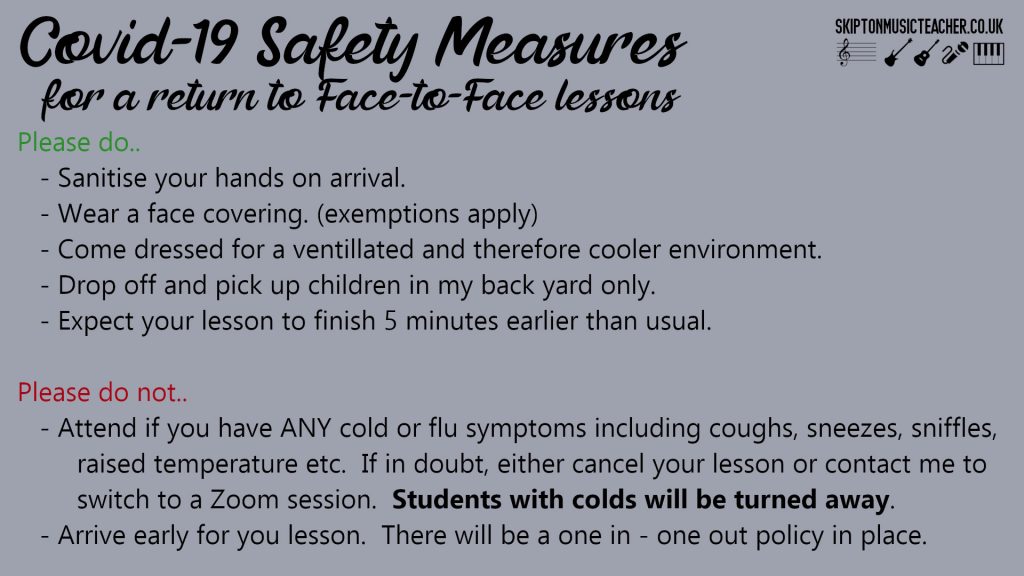Covid-19 Safety Measures
With face to face lessons resuming this week, I’ve put in a series of measures aimed to reduce the risk of spreading the Covid-19 virus. These policies are in compliance with current UK Gov advice for close contact businesses, and will remain in place until that advice changes:

Performance Psychology
I’ve recently been learning new some new music and recording it in an effort to raise funds for UNICEF – you may have seen the series called ‘Songs & Gallavants’ on my YouTube Channel. My most recent video is of a medley of tunes from the 80’s TV mini-series, The Thorn Birds. You can watch it here:
The medley I put together is comprised of the two main themes from the series: the ‘Main Theme’ – a jaunty jig-style piece with lots of ornaments in the right hand, and ‘Meggie’s Theme’, which is a lamenting, almost mournful melody with alternating minor chords in the accompaniment.
I chose to stitch these two themes together and turn them into a single performance because I’ve always loved the classic TV show, and over the six episodes that were originally made (starring Richard Chamberlain and Rachel Ward) these two melodic themes keep appearing. The music was written by Henry Mancini (of The Pink Panther and Moon River fame), and he masterly re-orchestrates his themes in many different ways so that there’s a consistent thematic musical thread while the treatment of each fragment reflects what’s happening in the love story that it accompanies.
My performance on the video here comes after a week or so of practise… and being familiar with the music as an audience member for most of my life. I decided to start with a haunting version of Meggie’s Theme, right at the top of the piano. I segued out of this and into the Main Theme by using some broken diminished chords that led to the dominant chord in the new key. (Diminished chords are good transitional chords because they can send the music in various tonal directions, depending on how you treat them – making a little step from any of the notes of the chords up or down can dramatically shift the feeling of the chord and its perceived destination). The Main Theme section of the music is relatively simple to play: it’s a steady 6/8 with lilting chords in the left hand and a single note melody in the right hand. The grace notes and mordents in the melody line might pose a challenge to new pianists, but it’s only really when the right hand also incorporates chords (in the bridge part of this section) that there’s any technical difficulties for those who are confident players.
At the end of the Main Theme, I use another chromatic chord shift to move back into the E minor and head into a full rendition of Meggie’s Theme, including the ‘longing’ section in the middle. Again, this music begins simply enough with broken chords in the left hand (now in 3/4 time) and a single note melody in the right hand. However, as we approach the middle of this section, the right hand melody shifts into octaves, sometimes with and sometimes without numerous harmony notes in between. In the meantime, the left hand broken chord pattern becomes more complicated and less predictable, often spanning a two octave range. Here the piano part is much more challenging than it previously was.
And, as a performer, this poses a psychological problem: the music begins fairly easy to play and remains that way until three quarters of the way in, when it suddenly becomes much more technically challenging. This is also the peak of the musical drama, so the part of the music that it’s most important to nail in terms of how the melody communicates to the audience. While I recorded this, I was always aware that the difficult bit is towards the end, knowing that if I made a mistake in that section it would mean starting right back at the beginning again and risking doing the same thing again. (Actually, I do make a couple of mistakes in the performance here, and I’ll write more elsewhere about the balance between accepting inevitable errors and seeking to give the best performance you possibly can.)
For me, the solution is two fold: 1) Dedicate the lion’s share of practise time to the parts of the music that pose the greatest challenges, and therefore are most likely to cause problems in the performance, and 2) Immerse myself fully in the music while I play it, trying not to get distracted by thoughts (anxieties) about the sections that are approaching / whether I’ll make a mistake and have to start again etc. If I really listen to my performance as I give it then I should be more successful in bringing the music alive in that moment. And, if something does go wrong later down the line, then so be it!
This Week’s Slots
From Tuesday this week I return to face-to-face lessons, with some policies in place to mitigate the chances of us passing Covid-19 onto each other. You can read more details on that HERE. Zoom will remain open as an option for the foreseeable future, though, so if you would like to book a lesson either online or in my Skipton studio, feel free to get in touch.
Here is the list of dates and times that you can book into:
- Mon 7 Sep
- 11:00 (30 mins – Zoom only)
- Tue 8 Sep
- 13:15 (2 x 30 mins)
- Fri 11 Sep
- 13:15 (2 x 30 mins)
